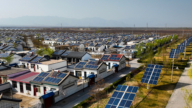【新唐人2011年9月23日讯】“中国社会科学院”最近发布的一份报告显示,中国大陆城乡收入差距比为3.23比1,这使得中国成为世界上城乡收入差距最大的国家之一。一些经济学者认为,中共现有的政策和对农民的歧视,是造成大陆城乡收入差距大的原因。也有学者认为,中国明显偏向权贵的收入分配政策才是根本原因。
“社科院”题为《中国城市发展报告第四号——聚焦民生》的报告说,早在2005年,国际劳工组织的资料显示,绝大多数国家的城乡人均收入比都小于1.6,只有三个国家超过了2,中国名列其中。
据“中国社科院”城市发展与环境研究所的资料显示,中国目前城乡收入差距比例是3.23:1,西部的一些省份这一比例更高达4:1以上。
不过,中国经济学者綦彦臣表示,按他自己收录的微观样本统计,也就是以100户典型中等收入的农村和城镇居民来测算,这个差距为11倍。
綦彦臣:“他们的实际收入差距,纯货币的应该是7.67倍到8.12倍。那么实际加上三项,第一项交通方便程度,第二个综合卫生条件,就医方便度。通过三点,综合以上资料,实际差距是11倍。”
原中国国家统计局局长邱晓华也持这个观点。他认为,由于农民收入中40%为实物性收入,扣除这些和用于扩大生产的开支,中国城乡居民收入真实差距应该为5比1、甚至6比1,比20年前高出近三倍。
中国城乡收入差距比例如此高,学者綦彦臣归结于三个因素,就是中国的土地制度限制了农民资本使用的方便程度;以及户籍制度不合理;和农村的以党代政,使得治理效率特别低下。
綦彦臣:“第一个最大问题是中国土地制度问题。中国土地制度是让农民处于低收入、低福利状态的一个根本。第二点,中国户口二元制,分成农村户口,分成城市户口。城市二元户口制度造成了对农民的歧 视,这个歧视带来了他们的低收入。第三,中国农村治理体系基本失效,也就是说,中国农村党权占据了制权的位置。”
著名经济学家茅于轼把城乡收入差距大的原因,归为政策有利于城市人口。
茅于轼:“在城市化的过程中,城市获得的好处大,农村的好处小。好像农村的农民可以进城打工,他们的收入可以有所提高,但是这是市场的作用,现在中国政府的政策有利于城市人口,农民得不到公共服务。”
旅美中国社会经济问题专家程晓农认为,中国老百姓穷,是由于中共政府在收入分配政策上完全的抛弃了社会的公正,农民包括中低层的百姓都是被剥削的对像,加上贪腐使得贫富差距还在拉大。
程晓农:“收入分配明显的偏向于权贵阶层。而普通老百姓,普通的工人,包括农民工,无论他们怎么拚命的工作,他们创造的成果绝大部分都落在了政府的口袋里,被政府和权贵集团拿走了。而老百姓自己生活是始终处于一种艰难的状态,所谓勉强温饱,仅此而已。”
茅于轼认为,农民的财产主要是土地,虽然中国土地价格上升飞快,但这个收益不能成为农民的收益,变成了政府的收益。另外,义务教育拨款的差距也非常大,使农村义务教育水准跟不上城市。加上医疗、住房和户籍政策上的歧视,城乡差距更加拉大。
新唐人记者张丽娜、宋风、肖颜采访报导。
China’s Urban-Rural Gap Is Widening
Recently the Chinese Academy of Social Sciences (CASS)
released a report, stating that the urban-rural income gap
ratio is 3.23 to 1. This makes China the world’s No. 1
country with the largest urban-rural income gap.
Economists attribute this to China’s existing
discriminatory policies regarding rural population,
with some scholars narrowing down the reason
to the income distribution policy, favoring China’s elites.
CASS’s China Urban Development Report No.4 (Focus on
people’s livelihood) notes that back in 2005,
the International Labor Organization (ILO) data showed
the urban-rural income gap ratios of most nations
to be under 1.6. Only three countries, including China,
exceed this number.
According to CASS’s report, China’s current urban-rural
income gap ratio is 3.23 to 1.
In some western provinces, the proportion is
as high as 4 to 1 or even higher.
However, Chinese economist Qi Yanchen revealed
that according to his own statistics based on subsamples,
that is, 100 typical middle-income rural and urban residents,
the gap ratio is 11 times.
Qi Yanchen: “The actual income gap, in terms of net income,
should be 7.67~8.12 times to 1.
To that should be added three other factors: transportation
accessibility, integrated health conditions,
and access to medical services. Based on the above data,
the actual income gap ratio is actually 11 to 1.”
Former head of China National Bureau of Statistics,
Qiu Xiaohua, shared the same view.
He argued that 40% of farmers’ incomes are net incomes.
Excluding this part and capacity expansion costs,
China’s real urban-rural income gap should be 5 to 1,
even 6 to 1, nearly three times higher than 20 years ago.
Qi Yanchen attributes the high ratio to three factors:
China’s land system that limits the farmers’ access to capital,
unreasonable residency system and,CCP’s
(Chinese Communist Party) replacement of government
in all rural areas, making governance efficiency
especially low.
Qi Yanchen: “The biggest problem is China’s land system.
It is the root cause of farmers low-income and low-welfare.
Secondly, China’s binary residency system. It divides
the society into urban and rural households,
resulting in discrimination of farmers,
further lowering their income.
Thirdly, the basic failure of governance system in rural areas,
or CCP’s system to impose its cadres to govern.”
Renowned economist Mao Yushi believes that the reason
lies in the authorities’ policies in favor of urban residents.
Mao Yushi: “Large cities have obtained more benefits
during urbanization, but rural areas got only few.
It was said that farmers can work in cities for more income,
but that is the market mechanism playing its role.
The authorities’ current policies are in favor of urban
residents, but farmers cannot get access to public services.”
Cheng Xiaonong, US-based China economist, believes
China’s civilians are poor due to CCP authorities’ policies
on income distribution, which have completely abandoned
the social justice.
Farmers, including civilians at middle or low levels,
all become targets for exploitation,
and what’s more, the widespread corruption
is contributing to increase the wealth gap.
Cheng Xiaonong: “The income distribution has obvious bias
on elite strata. But ordinary civilians, including workers,
migrant workers, no matter how hard they work,
the majority of their labor’ fruits is taken by the government
and elite groups. So, civilians are always in a critical state,
barely able to feed and clothe, nothing more than that.”
Mao Yushi points that farmers’ main possession is the land.
But China’s quick-soaring land prices cannot become
farmers’ revenues as they go to CCP authorities’ pockets.
Besides, the urban-rural gap of compulsory
education funding allocation is very large too.
And the discriminatory polices on medical care, housing
and residency system, are widening this gap even further.
NTD reporters Zhang Lina, Song Feng and Xiao Yan




























